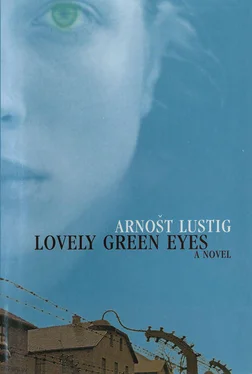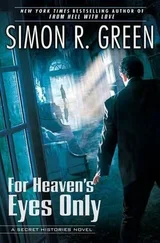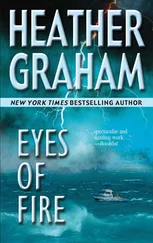Skinny tried to take her mind off the Obersturmführer’s body and her own. She thought of Maria-from-Poznan, who rolled her eyes when she heard something that she didn’t like. According to Ginger, Maria rolled her eyes about like a merry-go-round, so that one of her soldiers mistakenly took it for an expression of ecstasy.
“Better to be blown up by a shell than sleep with a Jewess,” he said. “We can proclaim with pride that the Einsatzgruppen are the war. It is through us that Germany will become great, just as without us it would go under. Let me tell you, I would kill my own father and mother if they stood against the Reich. Or a brother, if I had one.”
Obersturmführer Sarazin vividly remembered a punitive action in Pomerania, an action he was ordered to carry out by Karl Jäger, the commander of the Einsatzgruppen battalion. It took the rounded-up men, women, children and old people well into the night before they had dug a pit big enough for 5,000 people in the clearing of a pine forest. The soldiers ordered them to strip naked. There was a fresh breeze, a full moon and a cloudless sky. He would never forget that night, the scent of resin, the silence of those they shot one by one or in groups. He remembered clearly the way they fell or slipped into the pits, leaning forwards or kneeling, as the firing squad ordered them to make sure they dropped inside.
They advanced from the edge of the forest, one line after another, in groups of about 50 or 100. The firing stopped at about 20 minutes after midnight. The soldiers were anxious not to let those merely wounded at the bottom of the pit scramble out through the mass of cooling corpses and escape under cover of darkness. To make quite sure all were dead Sarazin gave orders for salvoes to be fired into the pit. He set his men an example by emptying several magazines himself. Then there was no need to post more than two men as sentries on each side of the mass grave.
He ordered tents to be pitched, so they wouldn’t have to sleep in the open, and gave instructions for reveille at 4 a.m. He arranged for the clothes of the dead to be packed in crates. He had a special tent put up for the representatives of the local administration, including the mayor, to ensure that the men, both volunteers and those hired as casual labourers, could begin to fill in the pit with clay at first light.
He was not afraid for himself. Only once had he had three sentries guard a spot where he spent the night — in an abandoned quarry — because he could not be absolutely certain that some Polish or Jewish bandits were not still hiding out nearby. He valued his life higher than the lives of bandits, and hadn’t blinked an eyelid when the Gestapo chief at Auschwitz-Birkenau informed him of the number of transports they processed there every day and night, or of the burning of the bodies in their own fat, even though that required using precious petrol.
He was quite used to the sight of a yellowish mass of corpses interlaced with each other like plaited rolls or Christmas loaves, piled from one side of the pit to the other, a mass of arms, legs, stretched necks and lifeless heads. Before falling asleep he relived the operation, the shots ringing in his ears — volleys, single shots — the orchestra of machine guns. But what he saw the following morning was beyond anything he had seen before — and he had seen plenty. It was an image worthy of a great poet, horrible and beautiful, because exceptional. He knew that this was something hardly anyone, and certainly none of his friends in the hinterland, had ever seen. For a moment it took his breath away. The dead, piled together in wild confusion so tightly there was practically no space between them, all of them the colour of a yellowish candle, had begun to move. None of the bodies remained still. They moved in waves, they shifted like branches rocked by the wind. He knew that they were not alive. He had already, by the light of a flashlight in his tent, begun to write his report.
They were dead. Even if some escaped the shootings they would have died of their wounds down in the pit. He had an accurate record of the number of rounds fired. His corporal had completed the account of ammunition, fuel, provisions and the number of trucks employed. The dead mass was moving its arms, legs and heads, hair was being ruffled, their lips and eyebrows were twitching and their eyes were being opened. Not even their genitals remained at rest, male or female, behind their pubic hair. What was going on? He rubbed his eyes. Huge numbers of rats were scurrying among the bodies, gnawing at the dead, creeping into their mouths and other orifices, into their armpits and between their legs. There were probably more rats than bodies. He felt sick. He wanted to vomit. He covered his mouth with his hand and felt a spasm in his guts. Blood rose to his head and into the scar round his scalp. He leant against a tree, but after a few seconds pulled himself together.
The sentries and the locals saw the same sight, but they had probably seen it before and didn’t seem surprised. The workers picked up their shovels and began to fill the pits. They were paid by the hour and already had forms in their pockets for the next job, also filling pits.
One day he would write a poem about it, a composition such as the generations before him had not encountered.
He could not resist the temptation of describing the event to this young whore.
“It appeared before me out of the night,” he said, “with the first rays of light, and it was disgusting; not only disgusting, it was revolting; it would have made you sick, but it was magnificent at the same time, wonderful, different from anything I had ever experienced. That night I stepped into a new era. I crossed a border which every one of us has inside us. It was the brutality and the inevitability of nature, for which nothing is extraordinary. The dead and the army of rats. I can’t forget it. If ever I write a great poem about anything — one that endures, after me, after us — as the greatest thing witnessed by my generation, then it will be about those bullet-ridden corpses looking like slaughtered pigs, and among them the nation of rats. The living feeding on the dead, the eternal cycle of life upon which we imprint our will; what for us began the war which will never end.” He paused.
“Those rats signified life. They brought movement to the dead, the way waves rise out of the ocean, the way grain crops wave in the breeze, the way clouds are driven who knows whither by a strong wind. I ordered my men to fire into the pit again, so that nothing, literally nothing, should move, but it didn’t seem to frighten the rats. They appeared to be at home among the heaps of corpses, from the bottom up and from the top down. Now, whenever I see a rat, and I saw some here in the corridor and beyond the gates in the snow, I feel as if I had failed to fulfil my intention of burying in the pits anything that still moved.”
Skinny remained absolutely still.
“A stench rose up from the corpses. No-one who hasn’t experienced this smell can know what it’s like. The wind brought the resin fragrance of pinewood and deep within the forest was a silence that suggested eternity. Some things one doesn’t forget,” he said.
She would never forget his words.
“Are you afraid of me?” the Obersturmführer asked.
“Perhaps.”
“Would you kindly decide on yes or no?”
She did not know which way to move.
The Obersturmführer pinned her legs down so that she could not move. The ceiling seemed to her to have dropped lower. You are a whore, so act like a whore, an inner voice told her. Do what he wants. But what did he want? She would understand if he struck her or shot her. Why else had he picked up his pistol?
Читать дальше


![Корнелл Вулрич - Eyes That Watch You [= The Case of the Talking Eyes]](/books/32103/kornell-vulrich-eyes-that-watch-you-the-case-of-thumb.webp)









